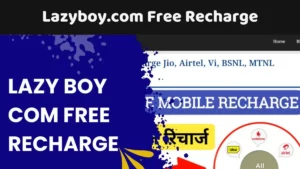The internet is a double-edged sword. While it offers unparalleled convenience, it also harbors risks like phishing scams, fake promotions, and fraudulent schemes. One such scheme that has recently gained traction is the “Lazyboy.com Free Recharge” offer. Promising free mobile or DTH recharges, this scam preys on unsuspecting users looking to save money. However, there’s a critical catch: Lazyboy.com has no connection to legitimate recharge services. Instead, it exploits the name of the reputable furniture brand La-Z-Boy (spelled correctly as la-z-boy.com) to trick users into sharing personal data or downloading malware.
Lazyboy.com Free Recharge

What is Lazyboy.com?
The first red flag is the misspelling of La-Z-Boy, a well-known American furniture company famous for its recliners and sofas. The legitimate website is la-z-boy.com, whereas “lazyboy.com” is a typo-squatting domain designed to mimic the brand. Scammers use this domain to create fake promotions, such as “free mobile recharge,” to lure users into their trap.
How the Scam Works
- Baiting the Victim: Users encounter ads or messages claiming, “Get free ₹500 recharge on Lazyboy.com!” These ads appear on social media, SMS, or phishing emails.
- Fake Website Interaction: Clicking the link redirects users to a fraudulent site resembling a recharge portal. They’re asked to:
- Enter personal details (phone number, email, bank info).
- Complete “tasks” like sharing the link with 10 friends.
- Download a malicious app disguised as a recharge tool.
- Exploitation: Scammers harvest data for identity theft, sell it on the dark web, or install malware to hijack devices.
Red Flags to Identify the Fraud
- Too Good to Be True: Free recharges without any strings attached are rare.
- Poor Website Design: Grammatical errors, broken links, and lack of HTTPS encryption.
- Pressure Tactics: “Hurry! Offer expires in 10 minutes!”
- Request for Sensitive Data: Legitimate recharge platforms like Paytm or Amazon Pay never ask for OTPs or CVV numbers.
The Psychology of Online Scams
Scammers exploit cognitive biases to manipulate victims:
- Scarcity Bias: “Limited-time offers” create urgency.
- Authority Bias: Using a reputable brand name (e.g., La-Z-Boy) to gain trust.
- Social Proof: Fake testimonials like “1,000 users recharged today!”
The Dangers of Engaging with Fraudulent Websites
- Data Theft: Stolen phone numbers and emails lead to spam or SIM-swapping attacks.
- Financial Loss: Unauthorized transactions via linked payment methods.
- Malware: Spyware can monitor keystrokes, steal passwords, or lock devices for ransom.
Case Studies: Real-Life Victims
The Student’s Mistake
A college student in Mumbai clicked a “Free Jio Recharge” ad on Instagram, landing on Lazyboy.com. After entering her phone number and completing a survey, she received a phishing link via SMS. Clicking it installed malware that drained her bank account of ₹15,000.
A Family’s Downfall
A father in Delhi shared the Lazyboy.com link with family WhatsApp groups to “help everyone save money.” The link spread rapidly, leading to multiple cases of identity theft and ₹2 lakh in collective losses.
How to Verify Legitimate Recharge Offers
- Stick to Trusted Platforms: Use only verified apps like Paytm, PhonePe, or official telecom provider websites.
- Check for HTTPS: Ensure the URL has a padlock symbol.
- Read Reviews: Search for user experiences on forums like Reddit or Trustpilot.
Cybersecurity Best Practices
- Use Antivirus Software: Tools like Malwarebytes or Norton can block malicious sites.
- Enable Two-Factor Authentication (2FA): Protects accounts even if passwords are stolen.
- Educate Yourself: Stay updated on common scams via resources like CERT-In (Indian Computer Emergency Response Team).
Legal Recourse and Reporting Scams
- File a Complaint: Report to CyberCrime.gov.in or local police.
- Contact Your Bank: Freeze compromised accounts immediately.
Legitimate Ways to Earn Free Recharges
- Google Opinion Rewards: Earn Google Play credits by completing surveys.
- Paytm Cashback: Participate in cashback offers for mobile recharges.
- Referral Programs: Jio and Airtel offer free data or talk time for inviting friends.
Conclusion: Staying Vigilant in a Digital World
The “Lazyboy.com Free Recharge” scam is a stark reminder of the importance of digital literacy. Always question offers that seem too good to be true, verify URLs, and prioritize cybersecurity. By staying informed and cautious, you can enjoy the benefits of the internet without falling victim to its pitfalls.
Please free recharge
Free recharge